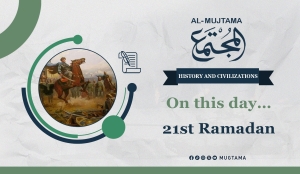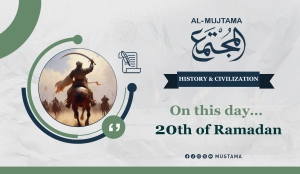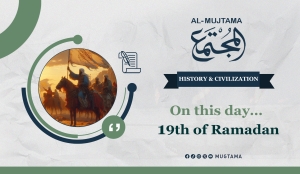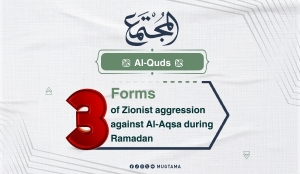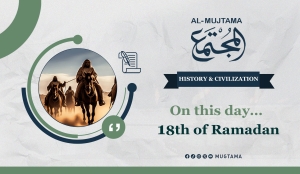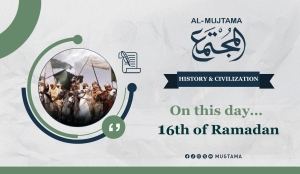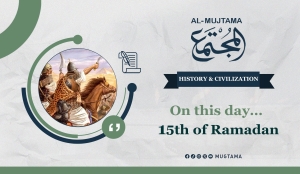Nada Gamal
Significant Events on the 21st of Ramadan
March 21, 2025The Battle of Tal Harem
On the 21st of Ramadan 559 AH, corresponding to August 12, 1164 CE, Islamic armies led by King "Nur al-Din Mahmoud Zengi" engaged in battle with Crusader forces commanded by six kings and princes, including the extremist Crusader Prince "Raymond III," Duke of Tripoli, and "Bohémond III," Prince of Antioch, as well as "Thorold II," Prince of Armenia, along with senior leaders, monks, and priests.
At the beginning of the battle, the Franks attacked the right flank of the Islamic army, causing it to retreat as if defeated. This was actually the Muslims' plan: to lure the Frankish knights into pursuing the retreating flank, cutting off their connection to the infantry of their forces. This way, the Muslims could manage to eliminate the infantry, and when the Franks returned, they would find no infantry to protect their backs.
With this strategy, the Muslims surrounded them from all sides, inflicting a severe defeat on them and substantial losses estimated at ten thousand dead and the same number of captives. Among the captives was Prince "Raymond" along with many leading figures such as "Reynald de Châtillon" and "de Courtenay." As a result, Nur al-Din seized the fortress of Harem, and later the city of Banyas, causing the Crusaders to suffer a significant defeat.
Death of Sheikh Ibrahim Izzat (On the 21st of Ramadan 1403 AH- June 2, 1983 CE)
On the 21st of Ramadan 1403 AH, the renowned preacher Sheikh Ibrahim Izzat passed away. He was one of the most prominent preachers who emerged in Egypt during the last quarter of the twentieth century.
Sheikh Izzat played a major role in the Islamic call during the 1970s and 1980s and had a significant impact on the awareness of several Islamic movements that he joined. He became famous for his influential sermons, which benefited thousands of Muslims.
Death of the Founder of the Ottoman State (21st of Ramadan in 726 AH, corresponding to 1326 CE)
On this day, the 21st of Ramadan in 726 AH, corresponding to 1326 CE, Sultan Osman I, the founder of the Ottoman state, passed away. He was succeeded by his son Orhan on the throne of the Ottoman sultanate.
Sultan Osman ibn Ertuğrul ibn Suleiman Shah was born in the year 656 AH, corresponding to 1258 CE. He is the founder of the Ottoman state and its first sultan and a leader of the Turks from the Seljuks. That year also marked the fall of Baghdad into the hands of the Tartars, and it seems that God Almighty had destined for him to be born on the same day that the last of the Abbasid caliphs was killed, so that he could revive the caliphate, young and vibrant, after it had grown old and weakened. He was born in the town of "Sogut," the same year that the Mongols, led by Hulagu, invaded Baghdad, the capital of the Abbasid caliphate. These events were monumental, and the calamities were severe.
Ibn Kathir states: "They attacked the city and killed all they could reach of men, women, children, elders, and youth. Many people took refuge in wells and unclean places, hiding there for days without showing themselves, and none survived except for the dhimmis among the Jews and Christians and those who sought refuge with them."
The calamity was immense, and the incident was grave. The nation weakened and deteriorated due to its sins and transgressions, leading to the Mongols being unleashed upon it, who violated honor, shed blood, killed souls, looted wealth, and destroyed homes. In that difficult period and the pervasive weakness of the nation, Osman, the founder of the Ottoman state, was born.
He passed away, may God have mercy on him, after a life full of conquests and jihad, having spent between 26 and 27 years in sovereignty. He left a commendable legacy for any ruler aspiring to combine worldly benefits with the rewards of the Hereafter. He exemplified justice to such an extent that it was said that his father Ertuğrul entrusted him with the position of judiciary in the city of "Karacahisar" after it was taken from the Byzantines in the year 684 AH / 1285 CE. In this position, he adjudicated a case between two men, one a Turkish Muslim and the other a Byzantine Christian, ruling in favor of the Byzantine against the Turk.
The Byzantine was astonished and asked him: "How can you rule in my favor when I follow a different religion than yours?" عثمان replied: "Rather, how could I not rule in your favor? The God we worship tells us: “Indeed, Allah commands you to return trusts to their rightful owners; and when you judge between people, judge with fairness. What a noble commandment from Allah to you! Surely Allah is All-Hearing, All-Seeing” [Surah An-Nisa, Verse 58]. The Byzantine was moved by this stance and declared his Islam.
Significant Events on the 20th of Ramadan
March 20, 2025The Conquest of Mecca: One of the greatest conquests that took place during Ramadan was the Muslims' conquest of Mecca. The banner of Islam was raised high. When the Prophet Muhammad (peace be upon him) appeared on the day of the conquest of Mecca, he entered the mosque while the idols were set up around the Kaaba. He began to pierce the eyes and faces of the idols with the tip of his bow, saying: "Truth has come, and falsehood has perished. Indeed, falsehood is [by nature] ever bound to perish." [Al-Isra, 81]. Then, he ordered that they be overturned on their faces.
Construction of the Kairouan Mosque: On the 20th of Ramadan in 51 AH (September 29, 671 AD), the Kairouan Mosque was built by Uqba ibn Nafi (may Allah be pleased with him).
Passing of Imam Malik: Imam Malik ibn Anas, the founder of the Maliki school of thought in Islamic jurisprudence, passed away on the 20th of Ramadan in 179 AH. His contributions to Islamic scholarship remain highly influential.
Significant Events on the 19th of Ramadan
March 19, 2025Establishment of Zaytuna University.
Tariq ibn Ziyad Controls Northern Iberia.
Establishment of Zaytuna University: On 19 Ramadan 1375 AH (April 30, 1956), the Tunisian government issued a decision to make the Zaytuna Mosque a specialized university of science called the Zaytuna University, and it became composed of five faculties.
Tariq ibn Ziyad Controls Northern Iberia.
Year 92 AH: On this day, 19 Ramadan in the year 92 AH, the commander Tariq ibn Ziyad succeeded in controlling northern Iberia at the beginning of the Islamic conquest of Andalusia.
3 Forms of Zionist aggression against Al-Aqsa during Ramadan
March 18, 2025
In light of the escalating aggression by the occupation against Al-Aqsa Mosque, and as part of a continuous and systematic plan to change its identity and impose complete control over it, the early days of the month of Ramadan witnessed unprecedented violations aimed at undermining the sanctity of the mosque and the rights of Muslims within it. These violations were not limited to mere temporary or circumstantial challenges but were calculated steps within a substitution plan aimed at Judaizing Al-Aqsa and imposing a new reality that aligns with the occupation's ambitions to alter the Islamic character of the holy city.
This aggression has manifested in several forms, most notably in the early days of the holy month, confirming that what is happening is not merely transient security measures, but part of a comprehensive Zionist project that seeks to eliminate the Islamic presence at Al-Aqsa as a precursor to establishing the alleged Temple on its ruins.
And Allah, the Exalted, reminds us in His Noble Book in the saying: (Who could be more wicked than those who prohibit the mention of God’s name in His places of worship and strive to have them deserted? Such people should not enter them without fear: there is disgrace for them in this world and painful punishment in the Hereafter.) (Al-Baqarah:114)
In the face of this dangerous escalation and the existential threat to Al-Aqsa Mosque, the Jerusalem International Foundation warns that these assaults go beyond being temporary military measures; they are part of a comprehensive plan aimed at eliminating the Islamic presence in Al-Aqsa. This scheme is not new; the occupation continues to implement its expansionist project, taking advantage of the international community's negligence and its weak stance.
From here, the institution affirms that defending Al-Aqsa has become a crucial battle that is not limited to Palestinians only but is the responsibility of the entire Islamic nation.
One of the most notable forms of this aggression that Al-Aqsa witnessed during the first days of Ramadan:
- Preventing I'tikaf by force:
In a precedent not seen since 2014, the occupation prevented worshippers from performing i'tikaf (spiritual retreat) on the first Friday of Ramadan and forcefully removed the worshippers and those in retreat. This step aims to undermine one of the most prominent aspects of devotion at Al-Aqsa Mosque, which serves as a spiritual protection against the ongoing Zionist plans.
- The hijacking of the audio system.
On March 9, the occupying forces stormed the Marwani Prayer Hall and seized two loudspeakers, under the pretext of not coordinating with the "Israeli" authorities. This move aims to disrupt prayers and prevent the sound from reaching the worshippers. This tactic is part of the occupation's plan to dominate the administration of the mosque, which is an exclusive right of the Islamic Waqf affiliated with the Jordanian government.
- Intensification of the siege and tightening of restrictions:
The occupation imposed three consecutive military cordons around Al-Aqsa Mosque, starting from the outskirts of the city to its gates, which led to a decrease in the number of worshippers compared to previous years.
In another provocative move, the entry of Suhoor and Iftar meals into the mosque was banned, and inspection patrols were conducted inside the mosque, which constituted an insult to the worshippers and provocation to their spirituality during the blessed month of Ramadan.
Read also: The occupation announces war on "Al-Aqsa" during Ramadan.
Significant Events on the 18th of Ramadan
March 18, 2025Death of Khalid ibn al-Walid (Sword of Allah): On the 18th of Ramadan, 21 AH (August 20, 642 CE )
Pledge of Allegiance to Hasan ibn Ali for the Caliphate: On the 18th of Ramadan, 40 AH (January 24, 661 CE)
Yusuf ibn Tashfin Unites Muslims in Al-Andalus: On the 18th of Ramadan, 484 AH (October 24, 1091CE)
Ottoman Army Enters Aleppo: On the 18th of Ramadan, 1256 AH November 10, 1840, CE
Establishment of the Almohad State: On the 18th of Ramadan, 539 AH (March 24, 1145CE)
- Death of Khalid ibn al-Walid (Sword of Allah): On the 18th of Ramadan, 21 AH (August 20, 642 AD), Khalid ibn al-Walid, renowned for his conquests over the Persian and Roman empires, passed away. He dedicated his life to jihad in the path of Allah.
- Pledge of Allegiance to Hasan ibn Ali for the Caliphate: On the 18th of Ramadan, 40 AH (January 24, 661 AD), Hasan ibn Ali was pledged allegiance for the caliphate after his father's assassination.
- Yusuf ibn Tashfin Unites Muslims in Al-Andalus: On the 18th of Ramadan, 484 AH (October 24, 1091CE), commander Yusuf ibn Tashfin successfully united the Muslims in Al-Andalus, ending the division among the Taifa kings.
- Ottoman Army Enters Aleppo: On the 18th of Ramadan, 1256 AH, (November 10, 1840, CE) the Ottoman army entered Aleppo after expelling the Egyptian army led by Ibrahim Pasha, following the Treaty of London.
- Establishment of the Almohad State: On the 18th of Ramadan, 539 AH, (March 24, 1145CE), the Almoravid state in the Maghreb ended, and the Almohad state was established. The Almohads, originating from the Zanata tribes, ruled the Maghreb and Al-Andalus between 1121 AD and 1269 AD, with their capital in Marrakech.
Significant Events on the 17th of Ramadan
March 17, 2025The Battle of Badr
On the 17th of Ramadan in the year 2 AH (624 CE)
Martyrdom of Imam Ali Ibn Abi Talib
On the 17th of Ramadan, 40 AH (January 24, 660 CE)
Establishment of the International Islamic Charity Organization
On the 17th of Ramadan, 1404 AH June 6, 1984CE
The Battle of Badr
On the 17th of Ramadan in the year 2 AH (624 CE), the Battle of Badr took place. This was the first major battle between the Muslims and the Quraysh of Mecca. The Muslim forces, led by the Prophet Muhammad (peace be upon him), achieved a decisive victory, significantly boosting the morale of the Muslim community and establishing their presence in the region.
Read also :
From Badr to Al-Aqsa Flood... How have Muslims dealt with the POWs?
The Death of Aisha bint Abu Bakr
On the 17th of Ramadan, Aisha bint Abu Bakr, the beloved wife of the Prophet Muhammad (peace be upon him), passed away. She was known for her knowledge, wisdom, and contributions to Islamic jurisprudence.
Martyrdom of Imam Ali Ibn Abi Talib
On the 17th of Ramadan, 40 AH (January 24, 660 AD), Imam Ali Ibn Abi Talib, the fourth Caliph of the Rashidun Caliphate, was martyred. Having embraced Islam early on, he participated in battles alongside the Prophet Muhammad (peace be upon him) and married the Prophet's daughter, Fatimah. He was renowned for his courage, eloquence, and oratory skills. Imam Ali was assassinated by the Kharijite Abdul Rahman Ibn Muljam Al-Himyari at the age of fifty-eight.
Establishment of the International Islamic Charity Organization
On the 17th of Ramadan, 1404 AH, the establishment of the International Islamic Charity Organization in Kuwait began following the approval of its basic law and the selection of its founding members.
Significant Events on the 16th of Ramadan
March 16, 2025The Death of Sayyida Aisha On the 16th of Ramadan in 58 AH (678 CE)
The Death of Khalid ibn al-Walid On the 16th of Ramadan in 21 AH (642 CE)
The Conquest of Aleppo On the 16th of Ramadan in 17 AH (638 CE)
The Siege of Constantinople On the 16th of Ramadan in 1094 AH (1683 CE)
The Birth of Ibn Khaldun On the 16th of Ramadan in 732 AH (1332 CE)
The Birth of Nur ad-Din Zangi On the 16th of Ramadan in 511 AH (1118 CE)
- The Death of Sayyida Aisha On the 16th of Ramadan in 58 AH (678 CE), Sayyida Aisha, the Mother of the Believers and wife of the Prophet Muhammad (peace be upon him), passed away. She was buried in Al-Baqi' at the age of sixty-seven.
- The Death of Khalid ibn al-Walid On the 16th of Ramadan in 21 AH (642 CE), Khalid ibn al-Walid, known as "The Sword of Allah" and one of the greatest military commanders in Islamic history, passed away. He played a crucial role in the early Islamic conquests.
- The Conquest of Aleppo On the 16th of Ramadan in 17 AH (638 CE), Muslim forces led by Abu Ubaidah ibn al-Jarrah and Khalid ibn al-Walid conquered the city of Aleppo, significantly expanding the Islamic state into Syria.
- The Siege of Constantinople On the 16th of Ramadan in 1094 AH (1683 CE), the Ottoman Empire began its second siege of Constantinople (modern-day Istanbul). This siege was a key event during the Great Turkish War between the Ottoman Empire and the Holy League.
- The Birth of Ibn Khaldun On the 16th of Ramadan in 732 AH (1332 CE), the renowned historian and philosopher Ibn Khaldun was born. He is best known for his work "Muqaddimah," which laid the foundations for various fields of study, including sociology and historiography.
- The Birth of Nur ad-Din Zangi On the 16th of Ramadan in 511 AH (1118 CE), the Muslim ruler and military leader Nur ad-Din Zangi was born. He played a significant role in the early stages of the Crusades and in the defense of Muslim territories against the Crusaders.
Significant Events on the 15th of Ramadan
March 15, 2025The Ottoman Empire's Victory Over Russia On the 15th of Ramadan 1224 AH (24th October 1809),
The Birth of Hasan ibn Ali On the 15th of Ramadan 3 AH (625 CE),
The Battle of Ain Jalut On the 15th of Ramadan 658 AH (1260 CE),
The Treaty of Hudaybiyyah On the 15th of Ramadan 6 AH (628 CE),
The Battle of Qadisiyyah On the 15th of Ramadan 15 AH (636 CE),
The Conquest of Rhodes On the 15th of Ramadan 53 AH (673 CE
The Ottoman Empire's Victory Over Russia On the 15th of Ramadan 1224 AH (24th October 1809), the Ottoman Empire defeated Russia in the Battle of Tatarija, killing 10,000 Russian soldiers.
The Birth of Hasan ibn Ali On the 15th of Ramadan 3 AH (625 CE), Hasan ibn Ali, the grandson of the Prophet Muhammad (peace be upon him) and the son of Ali ibn Abi Talib and Fatimah, was born. He is revered for his wisdom, piety, and leadership.
The Battle of Ain Jalut On the 15th of Ramadan 658 AH (1260 CE), the Battle of Ain Jalut occurred. Muslim forces, led by Sultan Qutuz and Baybars, achieved a significant victory against the Mongols, marking their first major defeat and halting their advance into the Muslim world.
Read also: Fall of the Abbasid Caliphate: A Reflection on the Causes and Consequences
The Treaty of Hudaybiyyah On the 15th of Ramadan 6 AH (628 CE), the Treaty of Hudaybiyyah was signed between the Prophet Muhammad (peace be upon him) and the Quraysh tribe of Mecca. This treaty was pivotal as it allowed Muslims to practice their faith without persecution and paved the way for the eventual conquest of Mecca.
The Battle of Qadisiyyah On the 15th of Ramadan 15 AH (636 CE), the Battle of Qadisiyyah took place. Muslim forces, led by Sa'd ibn Abi Waqqas, achieved a decisive victory over the Persian Empire, leading to the conquest of the Persian capital, Ctesiphon.
The Conquest of Rhodes On the 15th of Ramadan 53 AH (673 CE), Muslim forces led by Muawiyah ibn Abi Sufyan successfully conquered the island of Rhodes, further expanding the reach of the Islamic state into the Mediterranean region.
Significant Events on the 14th of Ramadan
March 14, 2025The Battle of Ajnadayn: On the 14th of Ramadan in 15 AH (636 CE)
The Conquest of Cyprus: On the 14th of Ramadan in 53 AH (673 CE(
The Death of Salah al-Din al-Ayyubi (Saladin): On the 14th of Ramadan in 589 AH (1193 CE(
The Death of Imam Ibn al-Jawzi: On the 14th of Ramadan in 597 AH (1201 CE (
The Battle of Ajnadayn
On the 14th of Ramadan in 15 AH (636 CE), the Muslim forces led by Khalid ibn al-Walid achieved a crucial victory against the Byzantine Empire at the Battle of Ajnadayn. This victory was pivotal in the expansion of the Islamic state into the Levant.
The Conquest of Cyprus
On the 14th of Ramadan in 53 AH (673 CE), Muslim forces led by Muawiyah ibn Abi Sufyan conquered the island of Cyprus. This significant achievement marked the expansion of the Islamic state into the Mediterranean region.
The Death of Salah al-Din al-Ayyubi (Saladin)
On the 14th of Ramadan in 589 AH (1193 CE), Salah al-Din al-Ayyubi (Saladin), the founder of the Ayyubid dynasty and the Muslim leader who recaptured Jerusalem from the Crusaders, passed away. He is remembered for his leadership, piety, and contributions to the Muslim world.
The Death of Imam Ibn al-Jawzi
On the 14th of Ramadan in 597 AH (1201 CE), the renowned Islamic scholar and preacher Imam Ibn al-Jawzi passed away. He was known for his prolific writing and contributions to Islamic thought and jurisprudence.
On this Day… 13th of Ramadan
March 13, 2025
The Battle of Buwaib
The Arrival of Umar ibn al-Khattab in Palestine and the Conquest of Jerusalem
The Martyrdom of Ottoman Sultan Murad I
The Pledge of Allegiance to Abd al-Rahman ibn Hisham for the Caliphate of Cordoba
The Outbreak of World War I
The Battle of Buwaib On the 13th of Ramadan in 13 AH (634 CE), the Muslim forces led by Al-Muthanna ibn Haritha fought and achieved a significant victory against the Persian Empire. This battle helped consolidate Muslim control over the region.
The Arrival of Umar ibn al-Khattab in Palestine and the Conquest of Jerusalem On the 13th of Ramadan in 15 AH (18th October 636 CE), Umar ibn al-Khattab arrived in Palestine after fierce battles, receiving the keys to Jerusalem and ensuring the safety of its people and their properties.
The Martyrdom of Ottoman Sultan Murad I On the 13th of Ramadan in 698 CE (15th November 1298 CE), Sultan Murad I was martyred after conquering Bosnia and Herzegovina. He achieved a decisive victory against a coalition of Serbs, Bosnians, Herzegovinians, Wallachians, and Moldavians at Kosovo, but was fatally stabbed by a Serbian soldier while inspecting the battlefield.
The Pledge of Allegiance to Abd al-Rahman ibn Hisham for the Caliphate of Cordoba On the 13th of Ramadan in 414 AH (28th November 1023 CE), Abd al-Rahman ibn Hisham was pledged allegiance as the Caliph of Cordoba, taking the title of al-Mustazhir Billah. His caliphate lasted for one month and seventeen days.
The Caliphate of Córdoba in Perspective
The Outbreak of World War I On the 13th of Ramadan, World War I is commemorated. Thirty countries participated in the war, which lasted four and a half years. The world was divided into two warring camps: one led by Germany, Austria-Hungary, and the Ottoman Empire, and the other by Britain, France, and the United States.

